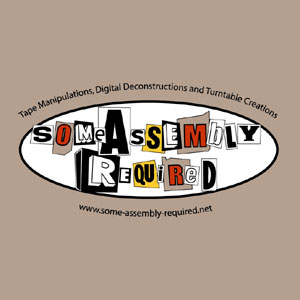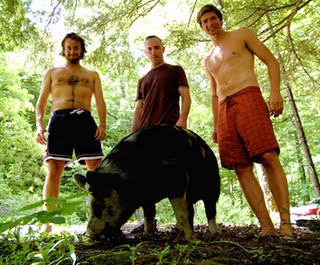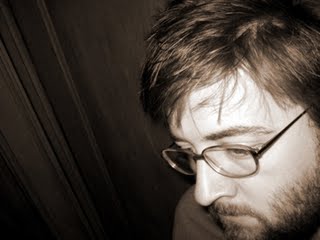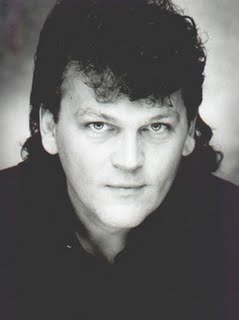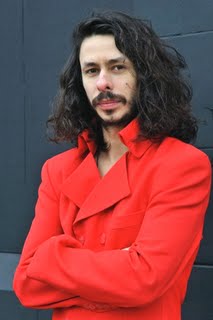 Sparo is London's Virgil Howe. I'm familiar with his work thanks to the hip hop compilation, "Deep Concentration 4," but he's also a producer, drummer and singer, playing with bands such as The Dirty Feel and The Killer Meters, who have a new album due out this Fall (2009).
Sparo is London's Virgil Howe. I'm familiar with his work thanks to the hip hop compilation, "Deep Concentration 4," but he's also a producer, drummer and singer, playing with bands such as The Dirty Feel and The Killer Meters, who have a new album due out this Fall (2009).Howe also remixed an album of tracks by his father's band (Yes guitarist Steve Howe), in 2003. I was mildly interested, being a fan in highschool, until I read that the remixes were made using the vinyl LPs as source material, as opposed to the original session recordings. In fact, at least one of the tracks actually references over a half dozen different songs by the band, making this more of a Plunderphonic response to Yes, as compared to your typical remix. That adds a whole extra dimension to the project, from my perspective at least. Check out "Yes Remixes" HERE.
As a drummer, he's played with everyone from Bryan Ferry and The Pet Shop Boys, to The Future Sound Of London's super-group Amourphous Androgynous. He's produced a series of singles and mixtapes for independent hip hop label Scenario Records, in the UK, and recently joined the London based trio, Little Barrie. Check them out HERE.
Without further ado, here's the SAR Q&A with Sparo's Virgil Howe...
*Name: Sparo
*Are there any additional names used to describe this project: I go by my own name, Virgil Howe, now when I produce. I changed from 'Sparo' at the end of last year, 2008, when an artist called himself Sam Sparro and went straight in at number one! I have used the name 'Verge' for certain projects; some remixes, including the Yes Remix album I did, and my piano tunes.
*Members: I also play drums with Little Barrie, Amorphous Androgynous, The Killer Meters and The Dirty Feel.
*Tape manipulations, digital deconstructions or turntable creations: See “History” below.
*Is there a story behind your name? The name Sparo was given to me by an alien being from Sirius, the dog star, who contacted me in my early teens whilst I was in the remote countryside. It came as a vision to me in the middle of the night. White light was streaming through the curtains and a voice told me that one day there would be only truth, that there were already efforts being made to ready earth for their arrival and that I would help them by creating music that would inspire interstellar communication. I hope they don't mind me changing it!
*Location: London, England
*Original Location: London, England
*What is your creative/artistic background: I have a live act which incorporates my production with me drumming and guest musicians. I call it a Psychedelic Disco Show as I've moved away from the Hip Hop scene and more toward the electro/disco side of things. I play drums with a backing track running from Ableton Live, my bass man Kerim Gunes and an array of amazing vocalists and Mcs; Jen Howe, Karime Kendra, Dave Sanderson, Foreign Beggars, as well as singing and triggering bleeps and sounds myself.
*History: I started playing pretty young, my parents told me my eyes lit up with excitement the first time I hit the keys of our Moog synthesizer at the age of four, so I suppose it all started there! My dad, guitar legend Steve Howe, always encouraged me to write music. Showing me chords and recording techniques in our home studio, so I've been very lucky. Brought up around the prog rock maddness of Yes, I've never felt restricted by genres, and the idea of having lots of different projects on the go seems totally normal to me as my dad's a complete workaholic. I love all elements of heavy metal, drum and bass, hip hop, electro, 60’s soul, funk, ska, rock n roll and psychedelic music. I started producing around the same time as drumming, the mid-90s, up till then I had been playing the piano. I dabbled with Jungle/Drum and Bass, cutting a few dubplates. But not really knowing how to break into the scene, I moved onto Hip Hop as my friend Barney bought an Emu SP1200 sampler. As we only had that and a small mixing desk and no Mcs, it all became quite experimental sounding. I then got a MPC200xl sampler, which I made the Yes Remix album on, in 2003, mastering the album in Abbey Road from Mini-disks! I now use Ableton Live, still with my MPC2000xl and synths, also doing some recording with a Roland 2480 hard disk recorder.
*Born: I was born and am still based in London.
*Motivations: I'm motivated by loads of things, I obviously want to impress people with my sounds (my wife Jen in particular!), but I also want to make music that I would like to hear. Whether I'm chilling out or travelling and want to hear something mellow, or I'm out in a club and want to hear something banging I want to be able to make that kind of music.
*Philosophy: I know what I want to hear and I'm getting closer to knowing how to make it sound like I want. I think that is all you need to start making music, knowing what you want to hear. It’s just getting it to other people who hear what you hear, that’s the hard part!
*How would you like to be remembered: I think music is the ultimate time capsule, it lives on forever. We still have all the great composers work being played by orchestras all over the world. The revolutionary sounds of the 60’s still sound just as fresh today. So I have no doubt that if you can make something special, it will live on forever.
*Web address:
www.myspace.com/sparoworlds
www.facebook.com/pages/VIRGIL-HOWE/19690562705?__a=1
www.some-assembly-required.net
